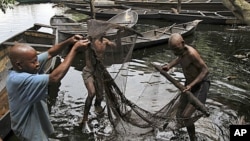Nigerians in the oil-rich Niger Delta are asking a U.S. court to grant them $1 billion in compensation from Shell for damages from oil spills.
The suit - on behalf of people from the Ogale community in Rivers State - asks a court in the U.S. state of Michigan to award damages against Shell Oil Company for decades of pollution caused by oil spills.
Ogale Chief Godwin Okpabi says the $1 billion claim is tiny compared to the profits the Anglo-Dutch firm makes in the Niger Delta.
"In Detroit, Michigan, we are asking for compensation, which is the oil you have taken and you've made billions and billions. But since you have caused injuries to us, you have given us some permanent damage, you caused a discomfort to us, pay us money. And we are asking for peanuts, one billion U.S. dollars," he said.
Water pollution
A United Nations environment report in August said it could take 30 years to clean up oil spills in the Niger Delta, where the World Health Organization says contamination by carcinogens in some drinking water is 900 times safe limits.
"What is left if you have been drinking water that is contaminated at 900 percent level and your people are dying? You have cancer in your body. What are you living for? We will all lie down on the road and stop them from coming to take oil from here," said Okpabi.
The government is supplying fresh water to Ogale because most of its local sources are polluted. Area youth leader David Awaka says there are large signs throughout the community warning people not to drink contaminated water.
"The directive from the Ministry of Water Resources in River State is that we should educate our people, tell them to stay away from the water. Because the water is acidic and we are doing that," Awaka said.
Sabotage, theft
Shell says most of the oil spills in the Niger Delta are caused by sabotage and theft. Whatever the reason, the firm says it has a system in place to clean up spills as quickly as possible.
The long-running environmental degradation of the Niger Delta sparked attacks on oil facilities by armed militants, who have since reached an amnesty deal with the federal government.
It also led to a civil disobedience campaign by author Ken Saro-Wiwa who was hanged by a military tribunal in 1995 under the rule of General Sani Abacha. That execution resulted in Nigeria being suspended from the Commonwealth of Nations for more than three years.
The $1 billion claim against Shell is being brought under the U.S. Alien Tort Statute of 1789, which holds companies in the United States liable for breaching international law. It is the same statute under which the U.S. Supreme Court has agreed to hear a separate case by families in the Niger Delta alleging that Shell was complicit in human rights abuses during General Abacha's military rule.




